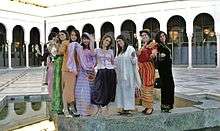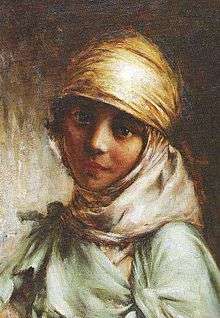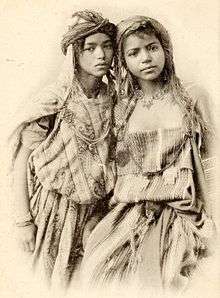Women in Algeria
 Algerian women dressed in traditional garbs. | |
| Gender Inequality Index | |
|---|---|
| Value | 0.391 (2012) |
| Rank | 74th |
| Maternal mortality (per 100,000) | 97 (2010) |
| Women in parliament | 25.6% (2012) |
| Females over 25 with secondary education | 20.9% (2010) |
| Women in labour force | 15.0% (2011) |
| Global Gender Gap Index[1] | |
| Value | 0.5966 (2013) |
| Rank | 124th out of 144 |

During the 1962 Algerian War of Independence, Algerian women fought as equals alongside men. They thus achieved a new sense of their own identity and a measure of acceptance from men. In the aftermath of the war, women maintained their new-found emancipation and became more actively involved in the development of the new state. Algeria is regarded as a relatively liberal nation and the status of women reflects this.[2] Unlike other countries in the region, equality for women is enshrined in Algerian laws and the constitution.[2] They can vote and run for political positions.[3]
Marriage and personal life
The legal age for marriage is eighteen for women, twenty-one for men.[4] Many Algerian women are getting married and starting families at much older ages than they did under French Rule. Education, work commitment, and changing social attitudes are the reasons for the change.
In 2010, the total fertility rate was 1.76 children born/woman. This is a drop from 2.41 in 2009 and 7.12 in the 1970s just after the Algerian War of Independence from France.
French colonizers actively opposed veiling because they viewed it as a symbol of national and religious values and beliefs that they sought systematically to undermine. In reaction to French pressure, Algerians stubbornly clung to the practice and after independence actually increased its use. Paradoxically, however, this development also resulted from the increased freedom enjoyed by women.
Education and employment
Prior to the country's Independence, very few native Algerian women could read and write. This was the result of a French-imposed ban on education for the entire native Algerian population. The remnants of this policy still manifests today in the significantly low literacy rate found in women over the age of 40.
The literacy rate of women is still lower than that of men (it is female: 73.1% and male: 87.2% as of 2015 estimates, population 15 years and older).[5]
Post-Independence, North African and Algerian women enjoy many more human rights than their counterparts in neighboring and other African countries. Algerian women can inherit property, obtain a divorce, retain custody of their children, gain an education and work in many sectors of society.[3] Women make up 70 percent of Algeria’s lawyers and 60 percent of its judges.[3] They also dominate the fields of medicine, healthcare and science.[3] Increasingly, women contribute more to household income than men.[3] As of 2007, sixty-five percent of university students are women, with more than 80% joining the workforce after graduation.[3] They are encouraged by family members to become educated and contribute to Algerian society. Algerian women are among the first in North Africa to become taxi and bus drivers.[3] Their numbers are also increasing in the police force and security positions.[2]
Role of women in the Algerian War

Women fulfilled a number of different functions during the Algerian War. The majority of Muslim women who became active participants did so on the side of the National Liberation Front (FLN). The French included some women, both Muslim and French, in their war effort, but they were not as fully integrated, nor were they charged with the same breadth of tasks as their Algerian sisters. The total number of women involved in the conflict, as determined by post-war veteran registration, is numbered at 11,000, but it is possible that this number was significantly higher due to underreporting.[6]
There exists a distinction between two different types of women who became involved, urban and rural. Urban women, who constituted about twenty percent of the overall force, had received some kind of education and usually chose to enter on the side of the FLN of their own accord.[7] Largely illiterate rural women, on the other hand, the remaining eighty percent, due to their geographic location in respect to the operations of FLN often became involved in the conflict as a result of proximity paired with force.[7]
Women operated in a number of different areas during the course of the rebellion. "Women participated actively as combatants, spies, fundraisers, as well as nurses, launderers, and cooks",[8] "women assisted the male fighting forces in areas like transportation, communication and administration",[9] the range of involvement by a woman could include both combatant and non-combatant roles. While the majority of the tasks that women undertook centered on the realm of the non-combatant, those that surrounded the limited number that took part in acts of violence were more frequently noticed. The reality was that "rural women in maquis [rural areas] support networks"[10] contained the overwhelming majority of those who participated. This is not to marginalize those women who did engage in acts of violence but simply to illustrate that they constituted in the minority.
Notable figures
- Kahina - 7th century female Berber religious and military leader, who led indigenous resistance to Arab expansion in Northwest Africa.
- Djamila Bouhired and Djamila Boupacha - Algerian revolutionaries and nationalists who opposed French colonial rule of Algeria in the 1960s.
- Khalida Toumi - Current Minister of Communication and Culture and outspoken feminist activist.
- Assia Djebar - Novelist, translator and filmmaker. Most of her works deal with obstacles faced by women, and she is noted for her feminist stance.
- Souad Massi - Singer, songwriter and guitarist known for her political views and currently signed to UK-based "Island" records.
- Khadija Benguenna - Journalist and news reporter for the AlJazeera International channel. Known for criticizing Algeria's corrupt politicians.
- Zohra Drif - Retired lawyer and the vice-president of the Council of the Nation, the upper house of the Algerian Parliament.
- Louisa Hanoune - The head of Algeria's Workers' Party (Parti des Travailleurs, PT). In 2004, she became the first woman to run for President of Algeria. Hanoune won 4.22% of the vote coming second out of six candidates. Though the elections are widely believed to have been fraudulent as a means of reelectingv President Abdelaziz Bouteflika.
- Sofia Boutella - Dancer, mainly hip-hop and street dance, known as the Nile Girl from Nike Women advertising and backup for Madonna.
See also
- Algerian women in France
- Algeria women's national football team
- Algeria women's national volleyball team
- Algeria women's national handball team
- List of Algerian women artists
- Women in the Algerian War
- The Women of Algiers in Their Apartments
References
![]() This article incorporates public domain material from the Library of Congress Country Studies website http://lcweb2.loc.gov/frd/cs/. (Data as of 1993.)
This article incorporates public domain material from the Library of Congress Country Studies website http://lcweb2.loc.gov/frd/cs/. (Data as of 1993.)
- ↑ "The Global Gender Gap Report 2013" (PDF). World Economic Forum. pp. 12–13.
- 1 2 3 Lowe, Christian (6 August 2009). "Algeria's women police defy danger and stereotypes". Reuters. Retrieved 29 January 2012.
- 1 2 3 4 5 6 7 Slackman, Michael (26 May 2007). "Algeria's quiet revolution: Gains by women". The New York Times. Retrieved 29 January 2012.
- ↑ "Minimum Legal Age for Marriage without Consent". United Nations Data - A World of Information. Retrieved 29 January 2012.
- ↑ https://www.cia.gov/library/publications/the-world-factbook/fields/2103.html
- ↑ De Groot, Gerard, Peniston-Bird, Corinna. A Soldier and a Woman: Sexual integration in the Military. New York: Longman, 2000 p. 247
- 1 2 Lazreg, Marnia. The Eloquence of Silence. London: Routledge, 1994 p. 120
- ↑ Turshen, Meredith. "Algerian Women in the Liberation Struggle and the Civil War: From Active Participants to Passive Victims". Social Research Vol. 69 No. 3 (Fall 2002) p. 889-911, p.890
- ↑ De Groot, Gerard, Peniston-Bird, Corinna. A Soldier and a Woman: Sexual integration in the Military. New York: Longman, 2000 p. 223
- ↑ Vince, Natalya "Transgressing Boundaries: Gender, Race, Religion and ‘Fracaises Musulmannes during Algerian War of Independence." French Historical Studies. Vol. 33 No. 3 (Summer 2010) p. 445-474, p.445
External links
| Wikimedia Commons has media related to Women of Algeria. |

